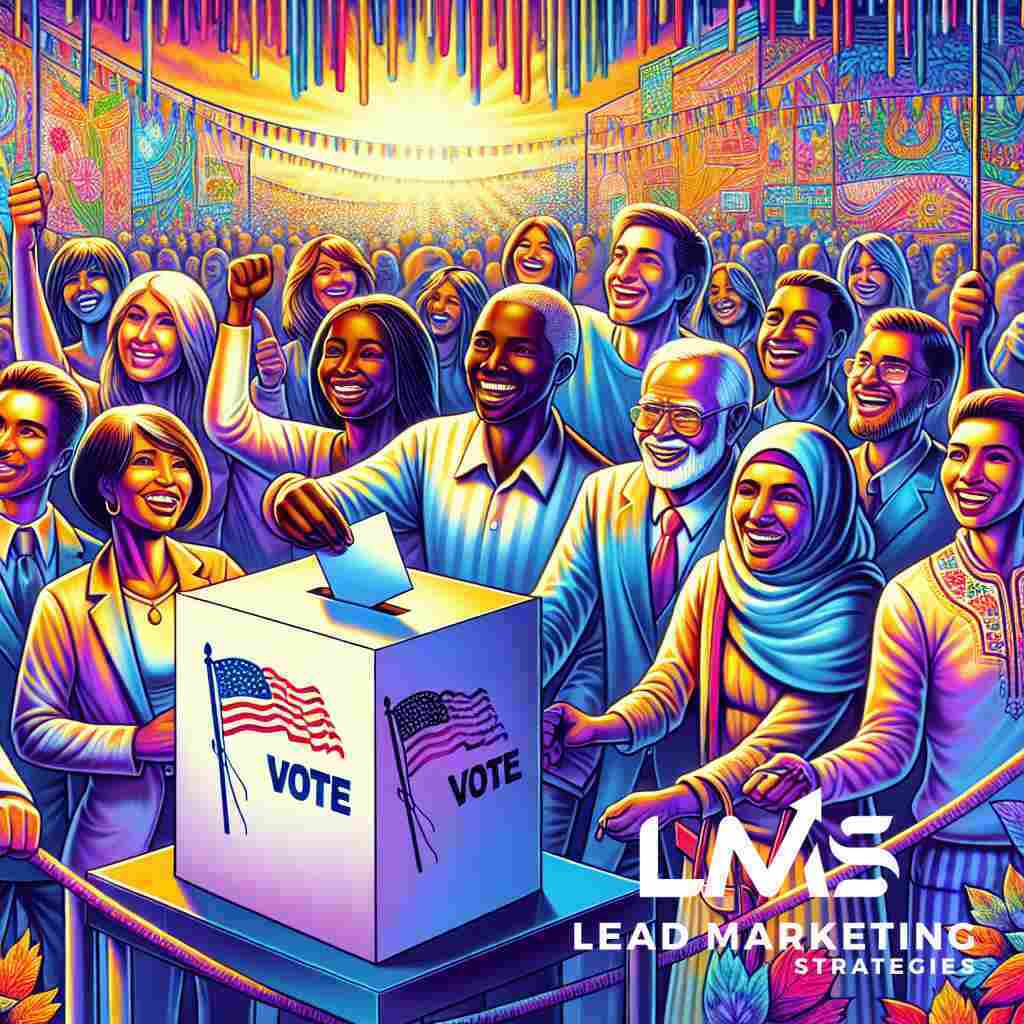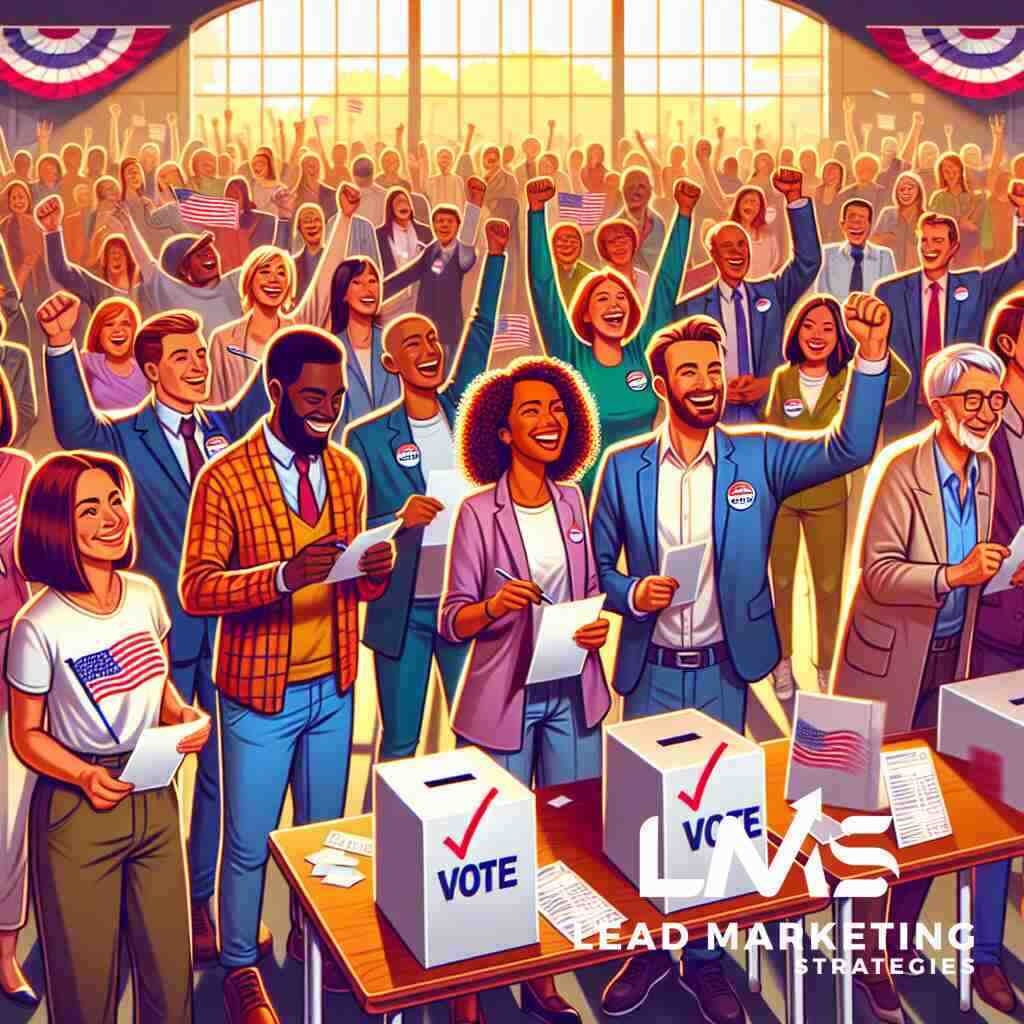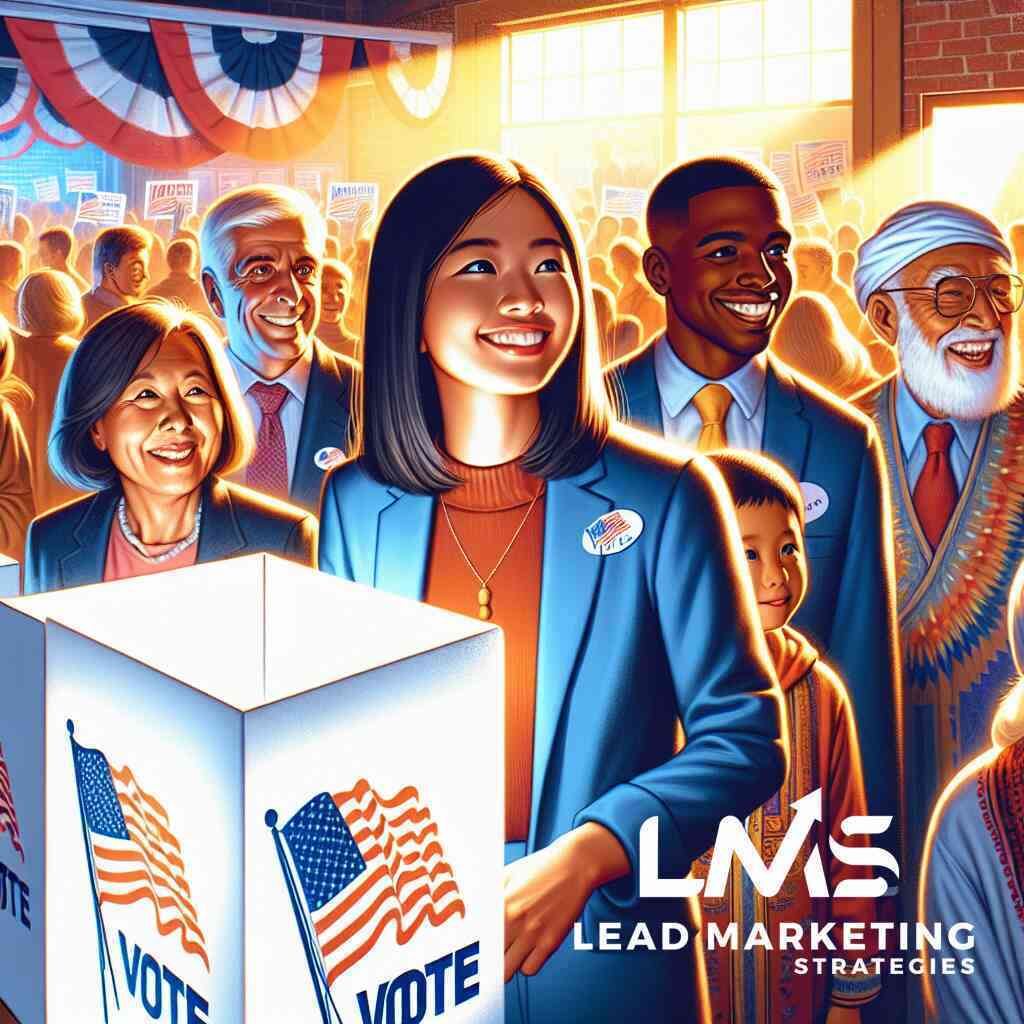Unlocking the Gateway to Voter Engagement
The Evolution of Political Marketing: From Traditional to Digital
The political marketing landscape has experienced a dramatic shift from traditional methods, such as door-to-door canvassing and TV ads, to highly sophisticated digital strategies. This evolution reflects the increasing importance of online platforms where voters spend their time and get information. Digital political engagement leverages advanced technology to reach voters more effectively. This transition allows for more dynamic political outreach, enabling strategies that adapt in real time and target specific voter segments. It is crucial for political entities to adapt to this change in order to maintain relevance and effectiveness in their campaigns.
The Importance of Voter Engagement: Why It Matters
Voter engagement is more than just a means to an electoral end; it’s about building a responsive relationship with the electorate. Engaging voters enhances democratic participation and helps build informed communities that are invested in the political process. Comprehensive strategic political marketing plays a pivotal role in this, utilizing techniques that resonate with voters and drive higher turnout. By employing multi-channel political outreach and engagement methods, campaigns can ensure that their messages reach every corner of the voter landscape. This holistic engagement is essential for securing electoral success and fostering long-term voter loyalty.
Analyzing Electoral Behavior: Understanding the Voter Psyche
Understanding electoral behavior is crucial for crafting strategies that effectively engage and mobilize voters. By examining data, campaigns gain insights into the socio-economic and psychological factors driving voter decisions. Utilizing voter data analysis impact, political strategists can anticipate trends and tailor their messages accordingly. Insights into electoral behavior and nuanced voter segmentation allow campaigns to connect with voters on a deeper level, ensuring that their communications are both relevant and persuasive. This analytical approach forms the backbone of successful political marketing strategies, helping campaigns build trust and loyalty among their target demographics.
Mastering the Art of Dynamic Campaign Strategies
Nuanced Voter Segmentation: Reaching Every Demographic
In the realm of political marketing, nuanced voter segmentation is essential for engaging diverse voter demographics effectively. By examining detailed electoral behavior and nuanced voter segmentation strategies, political campaigns can identify unique characteristics across age, ethnicity, and socio-economic backgrounds. This comprehensive strategic political marketing approach ensures that messages are tailored to resonate with specific voter groups, enhancing overall engagement. Utilizing advanced voter data analysis, campaigns can pinpoint key influencers within each segment and customize outreach efforts to align with voters’ interests and values. This method not only facilitates targeted election advertising but also enables more efficient allocation of resources, leading to increased campaign effectiveness.
Crafting Personalized Political Messages: The Power of Customization
Personalization is paramount in today’s political marketing landscape due to the demand for personalized consumer experiences in all facets of life, including politics. Crafting messages that speak directly to individual concerns fosters a deeper connection and enhances voter engagement. Utilizing cutting-edge election social media marketing techniques, campaigns can tailor messages that align with voter priorities and incorporate local issues, fostering familiarity and trust. Personalized political messaging is bolstered by sophisticated voter analytics, allowing for a real-time understanding of shifts in voter sentiment. By integrating these insights, political strategists can create dynamic, responsive messaging that adapts throughout the election cycle, establishing a strong presence in voters’ minds.
Harnessing Cutting-Edge Campaign Technology: Trends and Tools
The rapid evolution of campaign technology offers numerous opportunities for enhancing political outreach. From AI-driven data analysis to advanced social media campaigning tools, the technological landscape provides strategies for efficient voter engagement. Campaigns can utilize advancements in political campaign technology to automate repetitive tasks, streamline communication, and leverage big data insights. By incorporating state-of-the-art campaign consulting tools, political marketers can optimize resource allocation and focus efforts on high-impact areas. These innovations facilitate a deeper understanding of voter behavior and enable campaigns to adapt quickly to changing political climates, offering a competitive edge in electoral contests.
Interactive Political Platforms: Engaging Digital Spaces for Voters
Interactive political platforms have transformed the way campaigns engage with the electorate. These platforms promote active voter participation by offering spaces for dialogue, feedback, and community-building. Through engaging digital spaces like live Q&A sessions, interactive infographics, and personalized voter portals, campaigns can foster community outreach strategies that create a collaborative political process. Social media serves as a fertile ground for responsive voter communication techniques, encouraging transparent and meaningful interactions between candidates and constituents. These tools not only enhance democratic engagement but also empower voters by making them active participants in shaping the political narrative.
Strategic Political Marketing: Creating a Holistic Approach
To elevate voter engagement comprehensively, campaigns must adopt a strategic political marketing approach that blends traditional methods with innovative digital tactics. This necessitates a seamless integration of exploring dynamic political branding techniques and multi-channel voter outreach methods. By prioritizing electoral analytics and incorporating both digital and face-to-face interactions, campaigns can craft a cohesive narrative that resonates across all media. This integrated campaign management services model not only enhances reach but also builds a consistent brand message that reinforces trust and credibility among voters. By adopting a holistic strategy, political campaigns can foster enduring voter relationships, ultimately contributing to sustained engagement beyond election cycles.

Elevating Voter Engagement Through Comprehensive Outreach
Sophisticated Voter Analytics: Leveraging Data for Impact
In the rapidly evolving landscape of political marketing, leveraging sophisticated voter analytics is pivotal. By harnessing comprehensive voter data analysis, political campaigns gain profound insights into the preferences and behaviors of their electorate. This data-driven approach enables precise targeting and crafting of messages that resonate on a personal level, thereby bolstering voter engagement. Understanding electoral behavior through nuanced voter segmentation allows political strategists to navigate complex voter landscapes with agility and accuracy. By adopting effective political campaign consulting, campaigns can interpret complex data sets and transform insights into actionable strategies, leading to a decisive edge in political contests.
Multi-Channel Voter Outreach: Integrating Traditional and Digital
Achieving superior voter engagement requires a seamless blend of traditional methods and digital innovations. This multi-channel political outreach and engagement strategy capitalizes on the strengths of diverse media to amplify campaign messages. By integrating traditional outreach, such as print and face-to-face interactions, with dynamic digital platforms, campaigns can reach wider audiences while maintaining personal connections. This dual-faceted approach not only broadens reach but enhances the overall effectiveness of campaign messages, making it a cornerstone of robust digital and traditional voter outreach integration. It ensures that campaigns can adapt to the preferences of various voter segments, ensuring substantive engagement across all platforms.
Engagement-Driven Political Marketing: Building Long-Term Connections
Engagement-driven political marketing focuses on cultivating enduring relationships with voters that extend beyond the election cycle. This approach transcends conventional campaign paradigms by establishing trust and rapport with the electorate. By integrating strategies like personalized messaging and voter feedback loops, campaigns can reinforce their connection with the community. Political entities can implement strategies that align with voter values and ethical considerations, fostering loyalty and commitment. These practices lay the groundwork for building sustainable voter relationships, as they focus on understanding individual voter journeys and adapting campaign narratives to resonate with voter sentiments over time.
Responsive Political Branding: Adapting to Voter Feedback
In the realm of political marketing, responsive branding is paramount for maintaining relevance and resonance. By actively adapting to voter feedback, political campaigns can refine their brand identity to align with the evolving priorities of the electorate. This adaptability involves real-time adjustments in messaging and strategy, ensuring that the political brand remains pertinent throughout the campaign journey. Responsive political branding encourages transparent communication that acknowledges voter concerns and aspirations, enhancing credibility and authenticity. By doing so, campaigns can foster cultural voter resonance for deeper connections, thereby strengthening voter trust and enhancing overall campaign effectiveness.
Omnichannel Political Campaigning: A Seamless Experience for Voters
The concept of omnichannel political campaigning revolves around creating a unified, seamless experience for voters across all platforms. This strategy involves synchronizing messaging and interactions across various touchpoints, from social media and websites to direct mailers and events. By executing a well-coordinated omnichannel approach, campaigns ensure that voters receive consistent narratives that reinforce the candidate’s core messages and values. By exploring omnichannel political campaigning, political marketers can unify digital and traditional channels to create a cohesive voter journey that maximizes engagement and minimizes friction. This comprehensive approach not only amplifies voter reach but also strengthens campaign impact by providing a streamlined experience that resonates deeply with voters.
Conclusion: The Future of Political Marketing and Voter Engagement
Digital Political Influence: The Next Frontier
The future of digital political influence is rapidly unfolding, offering a transformative approach to voter engagement. As technology continues to evolve, campaigns can harness emerging digital platforms to create a more connected and interactive political ecosystem. By embracing advancements such as AI-driven insights and real-time data analytics, campaigns can significantly enhance their electoral reach and precision targeting. These technologies offer unparalleled opportunities to tailor political messages and engage voters more effectively. To stay ahead in the competitive political arena, it’s essential for campaigns to explore the future of digital political influence and adapt these innovations into their strategies, ensuring long-term relevance and influence.
Innovative Election Strategies: Preparing for Tomorrow’s Challenges
In an ever-changing political landscape, innovative election strategies are crucial for navigating tomorrow’s challenges. As voter expectations evolve, so too must the tactics employed in engaging them. Political entities must remain agile, adopting cutting-edge approaches that integrate both traditional and digital methodologies. This includes leveraging advanced electoral behavior and nuanced voter segmentation to understand shifting voter dynamics and preferences. Such strategies ensure that campaigns not only address current needs but also anticipate future trends, sustaining momentum and engagement well beyond election cycles. By investing in strategic foresight, campaigns can position themselves as leaders, proactive in meeting the demands of a dynamic electorate.
Cultural Voter Resonance: Fostering Deeper Connections
Fostering cultural voter resonance remains a cornerstone for establishing deep, genuine connections with the electorate. In a diverse society, campaigns that resonate culturally with their audience are more likely to build lasting loyalty and trust. By understanding and respecting voters’ cultural norms and values, campaigns can create messaging that is both authentic and impactful. Embracing strategies that harness cultural voter resonance for deeper connections allows political entities to engage in meaningful dialogues with constituents, fostering a sense of belonging and shared purpose. As campaigns continue to prioritize this emotional aspect of political marketing, they lay the groundwork for enduring relationships, pivotal for both immediate electoral success and long-term political advocacy.

Frequently Asked Questions
Question: How do Political Marketing Strategies utilize cutting-edge campaign technology to boost voter engagement?
Answer: Political Marketing Strategies harness cutting-edge campaign technology like AI-driven voter data analysis and state-of-the-art campaign consulting tools to enhance voter engagement. By leveraging these advanced tools, we automate repetitive tasks and streamline communication. This approach not only optimizes resource allocation but also ensures a deep understanding of electoral behavior insights, allowing us to adapt swiftly to changes in voter sentiment. Our seamless voter communication strategies help create dynamic political outreach that resonates deeply with various voter demographics.
Question: In “How to Elevate Voter Engagement with Political Marketing,” what strategies are highlighted for achieving seamless integration of traditional and digital voter outreach?
Answer: The blog “How to Elevate Voter Engagement with Political Marketing” discusses the effective approach of integrating traditional and digital voter outreach. At Political Marketing Strategies, we prioritize a multi-channel voter outreach strategy that combines traditional methods, such as print and face-to-face interactions, with innovative digital platforms. This integrated campaign management ensures that our messaging reaches wider audiences while maintaining personal connections, making the outreach more impactful. By adopting these strategies, we ensure comprehensive voter data analysis and cultural voter resonance, helping campaigns engage effectively with their target demographics.
Question: What role does strategic political marketing play in engagement-driven political marketing according to Political Marketing Strategies?
Answer: At Political Marketing Strategies, strategic political marketing forms the backbone of engagement-driven political marketing. By focusing on crafting personalized political messaging that speaks to individual voter concerns, we build long-term connections with the electorate. Our nuanced voter segmentation and sophisticated voter analytics allow us to understand voter preferences and tailor messages accordingly. This approach not only fosters trust and loyalty but also facilitates effective political brand optimization and real-time voter feedback. By utilizing these advanced political strategies, we ensure that political entities can maintain a strong, trust-based relationship with their communities.
Question: How do Political Marketing Strategies ensure responsive political branding to maintain relevance with the electorate?
Answer: Political Marketing Strategies emphasize responsive political branding as crucial for maintaining relevance and resonance with the electorate. By actively adapting to real-time voter feedback, we refine our brand identity to align with the evolving priorities and cultural voter resonance of constituents. This involves making necessary adjustments in messaging and strategy to ensure that the political brand stays pertinent throughout the campaign journey. Our approach promotes transparent communication, acknowledging voter concerns and aspirations to enhance credibility. These strategies foster engagement-driven political marketing that builds enduring connections and trust with voters.
Question: What innovative election strategies do Political Marketing Strategies recommend for addressing shifting voter dynamics?
Answer: Political Marketing Strategies advocate for innovative election strategies that incorporate both traditional and digital methodologies to address shifting voter dynamics. Our approach involves leveraging advanced electoral behavior insights and nuanced voter segmentation to anticipate changes in voter preferences. This foresight enables campaigns to develop adaptive strategies that not only address current voter needs but also prepare for future trends. By fostering cultural voter resonance and adopting a holistic strategy, we position political entities as proactive leaders, ensuring sustained voter engagement and trust beyond the electoral cycle.




